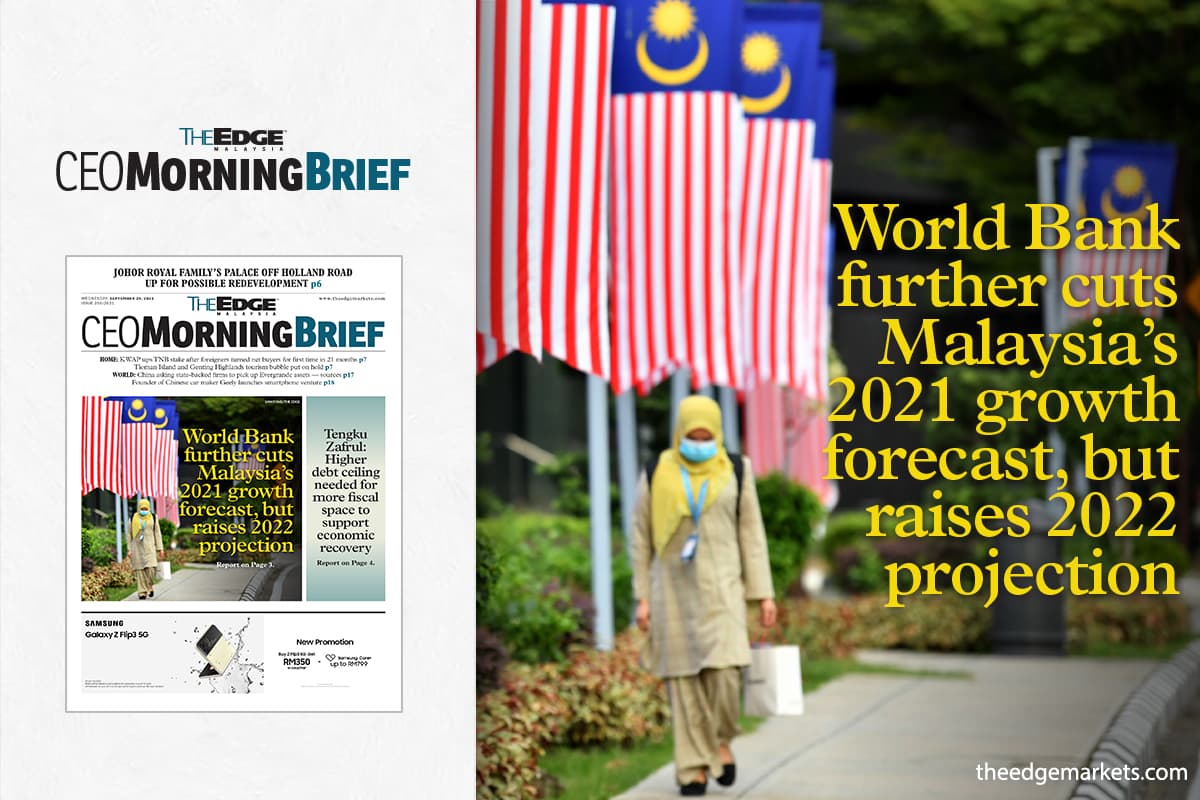
KUALA LUMPUR (Sept 28): The World Bank has further cut its economic growth projection for Malaysia to 3.3% in 2021, from an earlier estimate of 4.5% in June. This is the bank's second revision.
However, it has also raised its 2022 projection for the country, with a GDP growth forecast of 5.8% — up from 4.2% previously — as it anticipates a stronger recovery as corrections kick in.
The World Bank’s revised forecast for 2021 is within Malaysia's new official forecast that was revised down to 3% to 4% in August.
The bank previously predicted a growth forecast of 6% for 2021, but cut it to 4.5% to reflect a slower pathway towards suppressing the Covid-19 pandemic and a slower-than-expected vaccine rollout. It has a 4.5% growth forecast for 2023.
The World Bank attributed the latest downward revision to the country's ongoing Movement Control Orders, increased precautionary behaviour, and subdued labour market conditions, which are expected to weigh further on private consumption and overall economic growth.
"This is especially so for services related sectors, which have been heavily impacted by movement restrictions," it said in a statement on Tuesday.
The revised projection also takes into account the latest data, which covers the time when the Delta variant broke out.
Speaking at the bank's October 2021 East Asia and Pacific Fall virtual media briefing on Tuesday, World Bank lead economist Apurva Sanghi said the downward economic outlook revision for 2021 reflects the hard truth that the pandemic has been in charge for most of the year, leading to more severe movement restrictions in Malaysia.
Still, Apurva noted that there have been silver linings such as digitalisation having taken off in a major way, while the country’s external environment has been quite supportive to the export sector.
“Although this is not reflected in our 2021 projections, higher vaccination rates and other public health measures are enabling the economy to reopen further. Such is the basis of our projections of higher growth in 2022 and 2023,” he said, adding that the external sector will continue to provide support to the economy, especially in the exports of electric and electronic (E&E) goods and medical rubber gloves.
On the 12th Malaysia Plan, which is targeting an annual gross domestic product growth of 4.5% to 5.5% over the next five years, World Bank country manager for Malaysia Yasuhiko Matsuda deems the target “ambitious” due to the high degree of uncertainties wrought by Covid-19.
“The situations on the ground are changing weekly; almost daily, which makes it really difficult to predict how the economy would be looking even in a month or two,” he said.
“Still, we think that having a plan that articulates a long-term vision is highly appropriate and important, especially given the quality of the plan for which Malaysia is known. But at the same time, the circumstances require us to be very adaptable and nimble,” Matsuda said.
He stressed that the coronavirus will be here to stay, necessitating that both the government and society, in general, find ways of continuing with economic activities and social endeavours while minimising the impact of the virus.
Meanwhile, World Bank East Asia and Pacific chief economist Aaditya Mattoo said the Malaysian economy’s downward trend is expected to recover in 2022 and continue to improve in 2023.
He noted that while global value chains have remained relatively resilient, the emergence of semiconductor shortages threatens Malaysia's exports industry, which has been a reason why overall economic performance for the country has not been worse.
“Malaysia exports are heavily concentrated in E&E, therefore, the emergence of shortages such as those of semiconductors could end up disrupting the nation’s exports," he said. Malaysia can deal with these constraints by developing greater resilience in production, he added.
The bank expects the external sector to continue to provide support to the economy, namely in its export of E&E goods and medical rubber gloves, amid moderated momentum given the resurgence of Covid-19 in advanced economies and China.
To receive CEO Morning Brief please click here.


